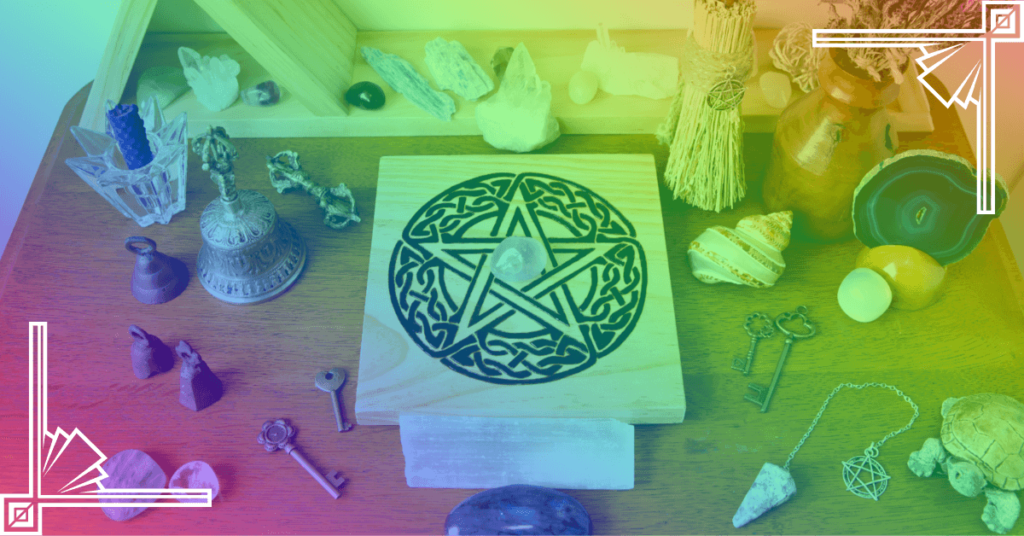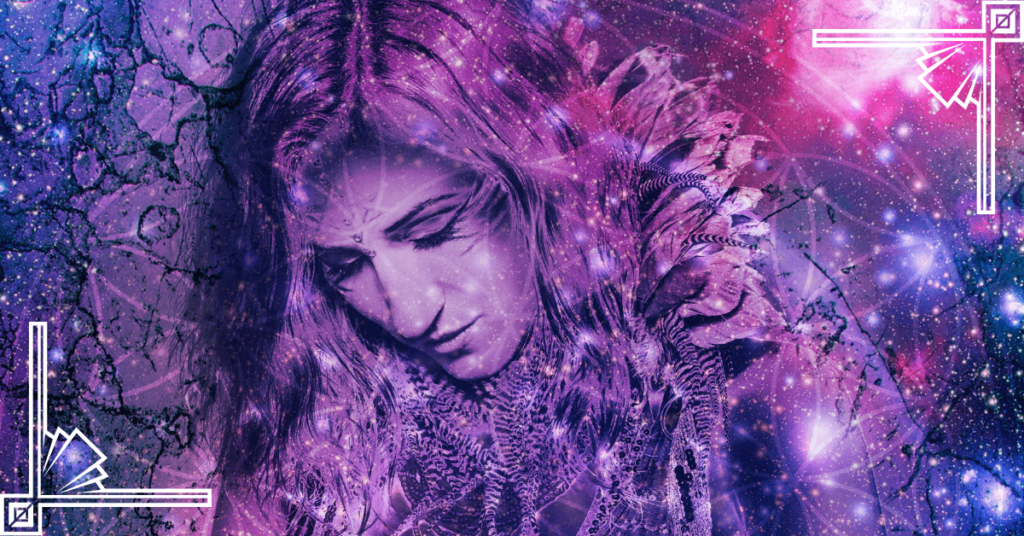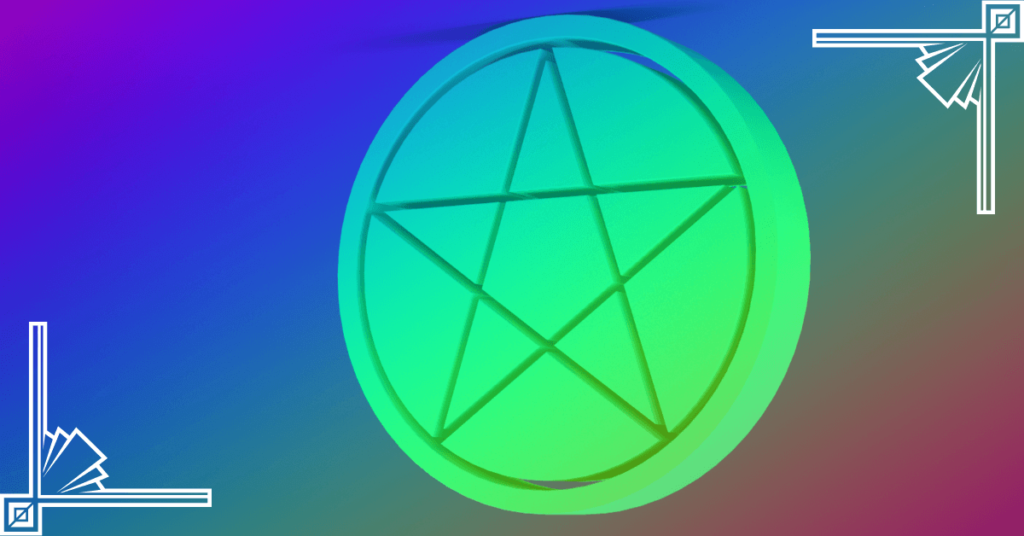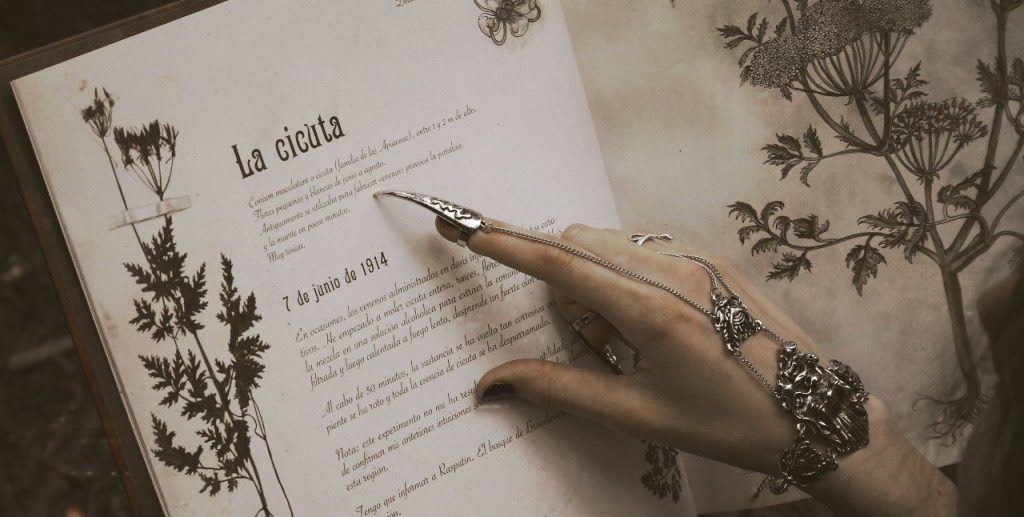As an Amazon Associate I earn from qualifying purchases
The path of Wicca is one filled with excitement, mystery, and wonder. If you’re seeking to become a Wiccan or learn more about what a Wiccan does and believes, you’ve come to the right place!
This article is meant to be a complete, in-depth guide for introducing you to the world of Wicca.
By the time you’re done reading this, you’ll be familiar with the following things:
- How to get started with Wicca
- Wiccan terminology
- Major Wiccan beliefs
- The God and Goddess of Wicca
- How to perform your own Wiccan spell
Are you ready to begin your journey?

Table of Contents
How to Get Started in Wicca
Wicca vs. Witch vs. Pagan
Core Beliefs of Wicca
Wiccan Deities
Seeker Ritual
Learn More About Wicca
How to Get Started in Wicca
Getting started in the world of Wicca doesn’t have to be a complicated affair.
It simply begins with a desire to learn more about the craft.
Memorizing spells, buying supplies, performing initiations rites—all that comes later. The first steps on the path of Wicca involve keeping an open mind and having a thirst for knowledge.
Becoming a witch is more about cultivating a spiritual mindset and embracing the magick of the world, as opposed to doing and saying specific things.
Creating Your Book of Shadows
However, one formal thing I would suggest you do to get started in Wicca is begin a book of shadows. This is one of the most important supplies a Wiccan has in her possession.
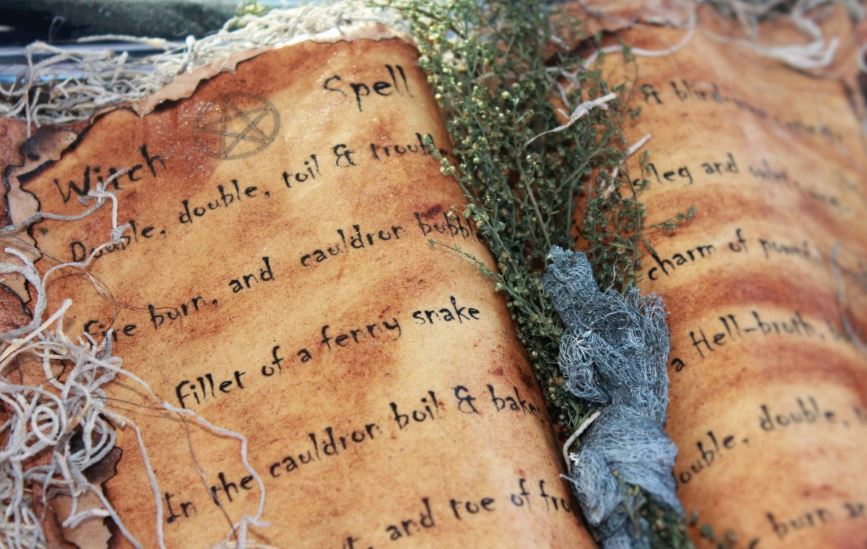
Put simply, it’s a place where a witch keeps everything she learns—spells, correspondences, spiritual insights, nagging questions, and anything else deemed important.
The book of shadows is a deeply personal, living document that charts your journey through the craft.
Your book of shadows can be a traditional journal or notebook, or you can create one digitally—what’s important is that you have a place where you can jot dot down everything you learn in your study of Wicca.
To begin your book of shadows, I recommend a dedication page. Write down today’s date and a short statement about your intention. For example, you might write:
“This book of shadows is dedicated to the growth of my spiritual journey.”
Using Your Book of Shadows
How you structure and organize your book of shadows is up to you.
Some witches prefer to write everything down in chronological order as they learn.
Others break theirs up into different sections—one area for spells, one area for gods and goddesses, etc. Everything about your book of shadows should be a unique representation of yourself.
Ultimately, getting started in Wicca is all about marching to the beat of your own drum and searching for truth, wherever the path may lead you.
There are no vows to take, there are no commandments to obey—there’s simply the magick of the universe waiting to be discovered!
Wiccan vs. Witch vs. Pagan
When you’re just beginning the study of Wicca, it can be easy to get tripped up by the terminology. There’s no need to be embarrassed by it—we all go through the “what in the world are they talking about?” phase.
By far, one of the biggest sources of confusion is the distinction between a Wiccan, a witch, and a pagan.
These three terms are very closely related, and it can be very challenging to keep them straight.
First, the good news—if you use the terms “Wiccan”, “witch”, and “pagan” interchangeably, 99% of the time people will know what you’re talking about. Outside of the magickal world, these three words frequently all refer to someone who practices some type of witchcraft.
However, in Wicca, words matter.
We say certain things at certain times and in certain contexts because we understand the power that language has to shape our world.
Words are powerful, and words are magickal.
For this reason, I think it’s worth learning the distinction between these three terms.
Wiccan
This is the easiest one: a Wiccan is simply a person who practices the religion of Wicca.
This religion was developed by British occultist Gerald Gardner and is considered a distinct branch of witchcraft. But while it might be the most well-known branch of witchcraft, it is not synonymous with witchcraft in general.
While Wiccans may incorporate other belief systems into their personal practices, there are in fact some teachings within witchcraft that are considered exclusively Wiccan.
Witch
This refers to anyone who practices any branch of witchcraft. This means that all Wiccans can also be considered witches. (For our purposes, a witch is anyone who believes in and works with the power of magick.)
But the reverse is not true—all witches are not Wiccans.
Pagan
Here’s where things get a little tricky.
Paganism is a broad umbrella term for religious practices that developed in the folk religions of rural areas (particularly in Europe).
Originally, the word “pagan” was used as an insult by Christians of the ancient Roman Empire towards people who continued to worship their traditional gods and goddesses instead of the Christian God.
Over time, people began to self-identify with the term pagan, and it’s rarely used as an insult anymore, though.
Keeping the Terms Straight
If you’ve been keeping track so far, you should have been able to deduce the following:
- All Wiccans are witches.
- Some witches are Wiccans.
- All Wiccans are pagans.
- Some witches are pagans.
- Some pagans are Wiccans or witches.
For example, a witch who only works with the traditional deities of ancient Egypt would not be considered a pagan because that pantheon does not come from a folk religion—it comes from the highly developed religion of a highly developed society.
On the other hand, if someone worshipped the traditional gods of the British Isles, they would be considered a pagan but not necessarily a witch if they didn’t utilize magick in their religious practices.
These are very minute and challenging distinctions to make. And like I mentioned before, it’s okay to mix them up or use them interchangeably.
You’ll rarely encounter a Wiccan, witch, or pagan who will berate you for innocently using the wrong word.
Core Beliefs of Wicca
It can be hard to pin down any beliefs that all Wiccans share. This is mostly because diversity of thought and practice are a hallmark of the religion.
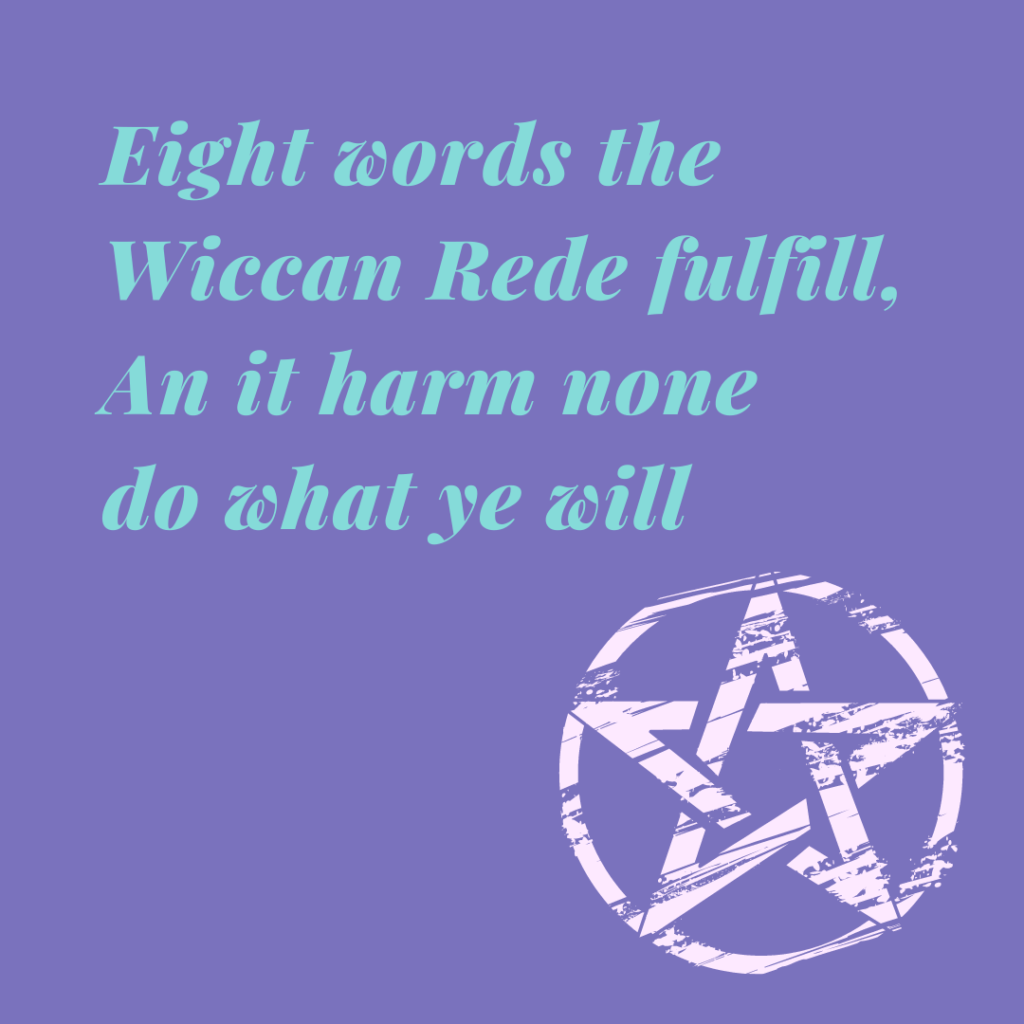
The Wiccan Rede
However, if there’s one belief that unites all of Wicca, it’s the Wiccan Rede.
This statement, though it looks deceptively short and simple, actually contains deep philosophical and moral insight. And it goes like this:
“An [if] it harm none, do what ye will.”
For those of us who aren’t well-versed in old English, this can be rephrased as something like, “Do what you will, as long as it doesn’t harm anyone.”
In some ways, this statement is similar to the ever-popular Golden Rule:
“Do unto others as you would have them do unto you.”
This is because it takes into account how our actions can impact others. However, the Rede adds a truly Wiccan twist to things—do what ye will.
Witches and Wiccans love their independence. This probably has a lot to do with the fact that, historically, folks have not had a lot of tolerance for us.
From the Christian church dictating (quite often, violently) which god was acceptable to worship to the struggle for governmental recognition of our religion, we’ve rarely been given the opportunity to be left to our own devices.
Finding your own path, doing your own thing, discovering your own truth—these are all important aspects of the Wiccan experience.
However, compassion for all forms of life on this planet informs our experience as witches, too. And with the Wiccan Rede both of these conflicting ideas are brought into harmony with one another.
The Rule of Three
Another common (but not universal) belief in Wicca has to do with the Rule of Three.
This is simply a belief that the energy we put into the world will come back to us threefold. This idea is slightly different from the Wiccan Rede, but it is absolutely consistent with it.
So, if you’re promoting peace and prosperity in your witchcraft, you should expect that good energy to return to you in some form.
And if you’re promoting negativity and evil, that will find its way back to you as well.
It’s important not to get too hung up on the “three” portion of the Rule of Three, though. Just because you do one good deed doesn’t mean you should expect three to come your way!
This is rarely an exact science—rather it’s more of a general reminder that karma exists and you can’t escape the consequences of your actions.
Wiccan Deities
Wicca has two primary deities of its own that hold a special position within witchcraft.
They are the archetypal (classic or traditional) representations of divine feminine and masculine energy. These deities are known as the Triple Goddess and the Horned God—or you might also hear them referred to as the Lord and Lady of Wicca.
The Triple Goddess
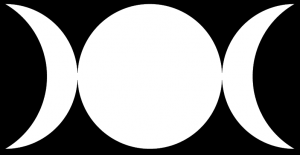
Take a look at the image above—that’s the symbol of the Triple Goddess.
She is depicted as the three phases of the moon, and each of those phases corresponds to a different representation of the Goddess.
Over the course of a month, the moon enters different phases, and we can observe this by watching its light gradually get larger and then smaller night after night.
The Maiden
When the moon is moving towards being full, this is known as the waxing moon. And within the Triple Goddess, it represents the Maiden.
The Maiden is a young woman and is a symbol of purity and beauty. We Wiccans turn to the Maiden for things like:
- A fresh start
- The blessing of people or objects
- Love magick
Basically, she represents all that is good and wholesome within the world.
Within the cycle of the seasons, the Maiden is celebrated on the spring equinox—with a Wiccan holiday known as Ostara.
The Mother
When the moon is full, it represents the Mother—the second face of the Triple Goddess. As our spiritual Mother, she represents fertility and maternal protection.
In traditional times, witches and pagans would turn to the Mother to ensure a good harvest and a healthy family.
We might not have crops to worry about now, but we still turn to this manifestation of the Triple Goddess for the guidance and comfort that only a mother can provide.
The Crone
Finally, as the moon nears the end of its cycle, it moves towards darkness.
This is known as the waning moon, and it represents the third part of the Triple Goddess—the Crone.
“Crone” is a term sometimes used to refer to a witch of advanced age. Some people may use it as an insult, but within Wicca, the elderly hold a position of importance. The Crone represents all the spiritual and magickal wisdom that experience brings.
A witch is at the height of her power as she nears old age, and the Crone is a celebration of that power.
The Horned God
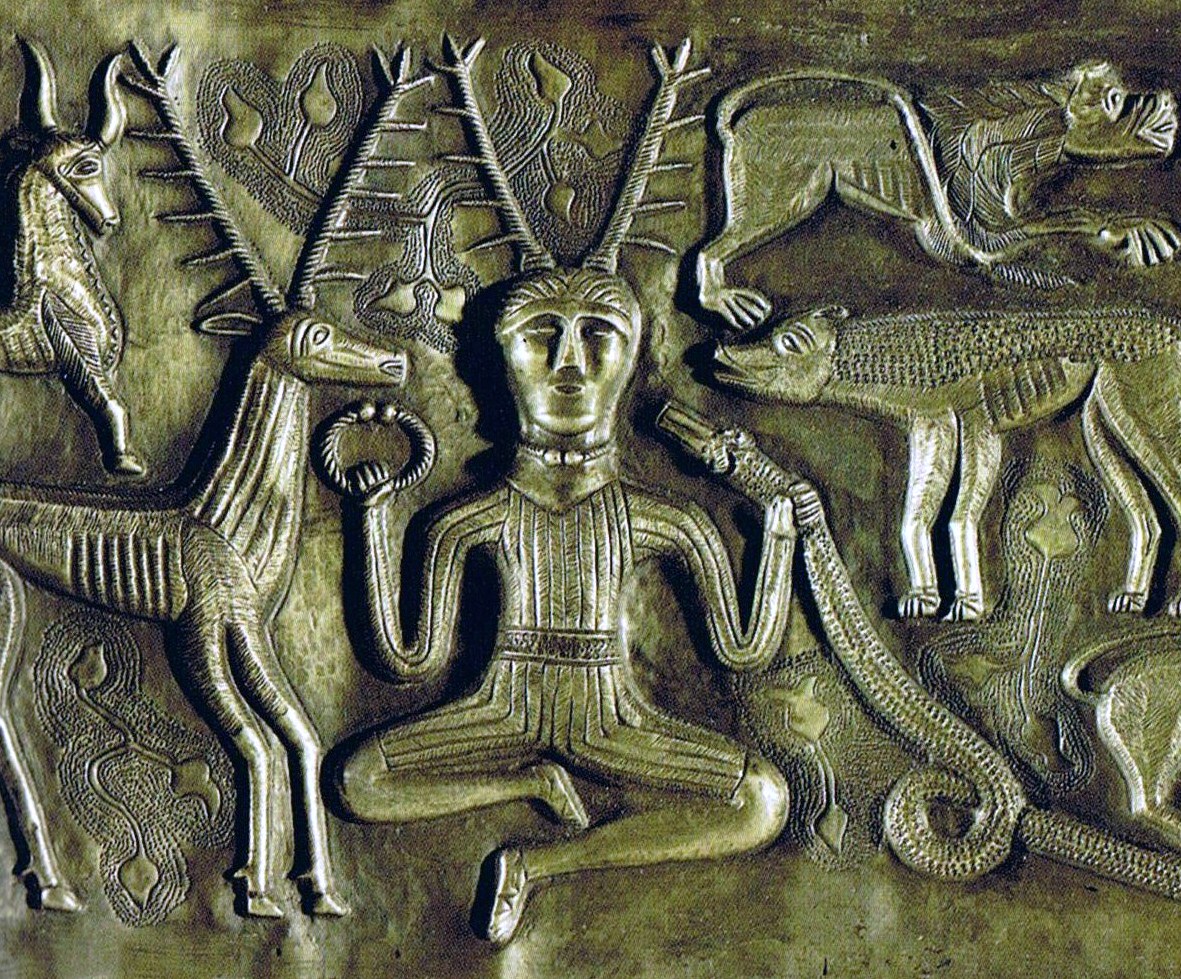
(image via Wikimedia Commons)
The Horned God is the classic male nature deity within Wicca.
He is commonly depicted as having the antlers of a stag and represents harmony with nature and the power of the natural world. Sometimes, you will hear witches refer to him as “Cernunnos”, which is the name he is given within Celtic witchcraft.
There are some people who like to claim that the Horned God is the Christian Devil. However, this is not the case.
The Wiccan God has no ties to Christianity whatsoever—in fact, he predates the religion by centuries. Cernunnos is not some malevolent entity who is going to poke you with a pitchfork and send you to Hell!
He is our protective Father who helps us attune ourselves to the natural world.
Seeker Ritual
If you’re interested in giving Wicca try but aren’t sure how to get started, I’ve created a simple seeker ritual just for you!
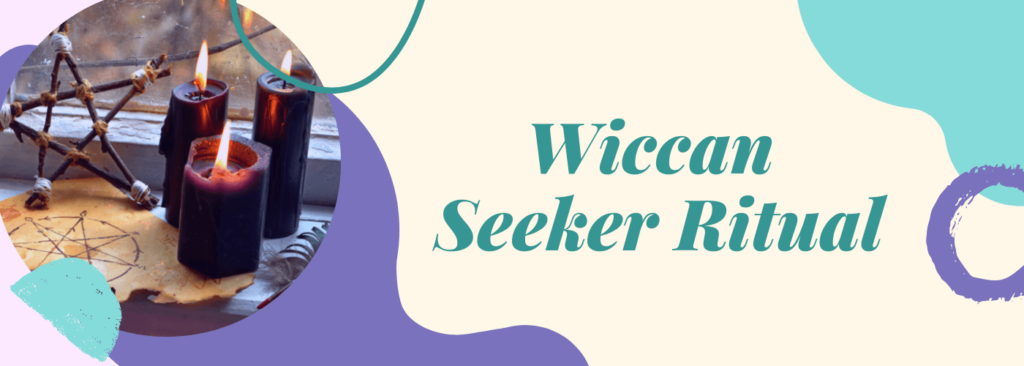
There’s nothing formal or binding about this ritual—you won’t have to sell your soul or swear allegiance to witchcraft or anything like that.
It’s simply a way to symbolize your intention to grow spiritually. You’ll be asking for divine guidance in your quest to find truth, and that’s something beneficial whether or not you decide to become a Wiccan.
This seeker ritual is also a good introduction to what Wiccan magick looks like.
While magick can range from incredibly fast and simple to incredibly detailed and complex, Wiccan spells and rituals have some components in common.
These include:
- Symbolism that affects one or more senses (sight, smell, etc.)
- Invoking of a deity (like the Triple Goddess)
- Particular words and actions that must be performed
This seeker ritual illustrates all three of these things, and I’ll be sure to point them out as we get to them. But for now, let’s get started!
Collecting Your Items
To begin with, you’ll need to collect a few items to use during the ritual. These will provide a visual representation to help strengthen the symbolism and spiritual energy of the process.
In this particular instance, you need to find four items that represent the four traditional elements of magick—fire, water, earth, and air.
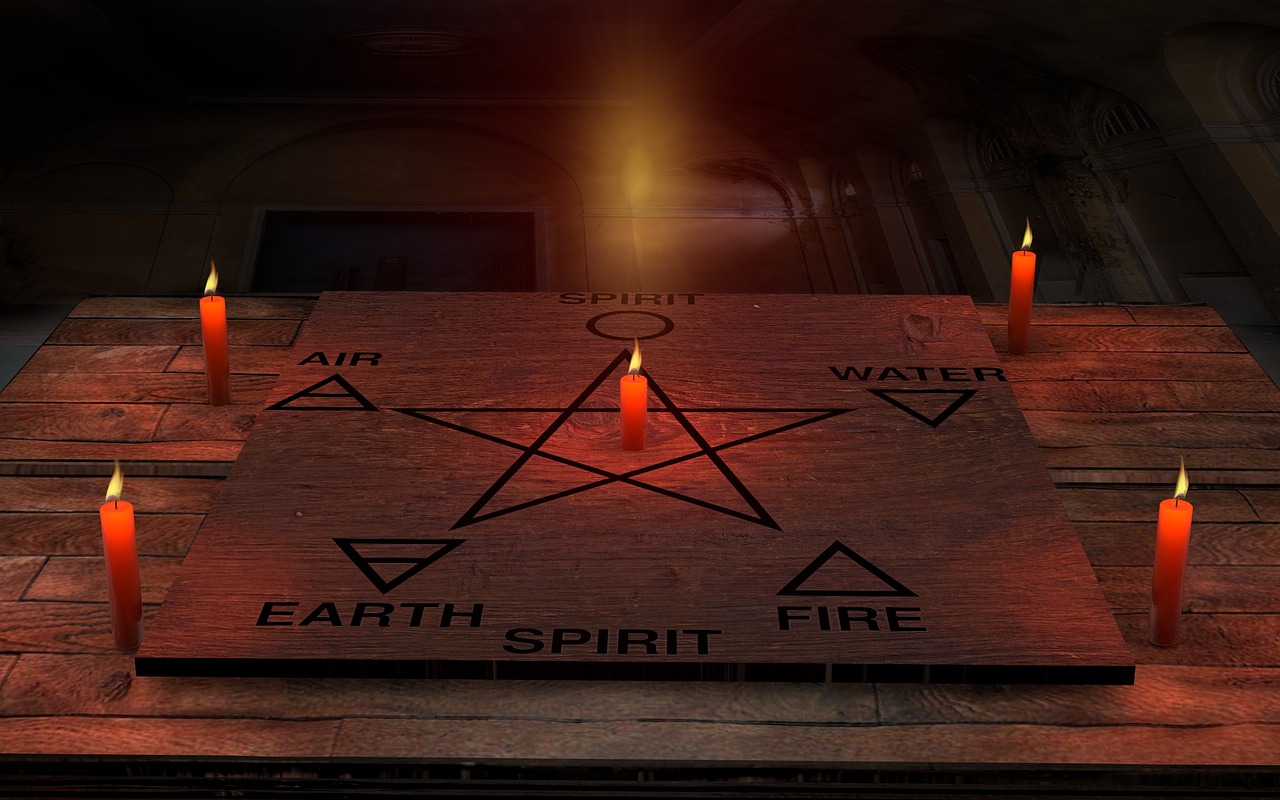
These four elements have traditionally been seen as the four building blocks of all life on earth.
Within Wicca, they each represent different attributes. For example, fire is a symbol of passion and desire, while earth is a symbol of wisdom and stability.
They show up pretty frequently in rituals, and you’ll be invoking these elemental spirits to assist you with different aspects of the seeker’s journey.
As far as the items you choose, feel free to get creative with this process.
Traditionally, a witch might choose a candle to represent fire, a flower to represent earth, incense to represent air, and a bowl of water to represent water.
But as long as the objects represent the elements in your mind, it’s fine to use them!
In addition to these four items, you’ll also need a candle—a white one, if possible. It represents divine energy and will be used near the end of the ritual.
Don’t forget the matches or a lighter! (And always use precaution when dealing with fire!)
So to recap, your item list should look like this:
- Object representing fire
- Object representing water
- Object representing earth
- Object representing air
- 1 white candle
- Matches or a lighter
Performing the Ritual
Clear a space and place your four elemental objects on the ground, as if they were the four points of an invisible square.
Stand in the middle of that square (with the candle near your feet). Clearly say the following:
All spirits of goodwill are welcome here to join me on my spiritual journey. May I learn the truths you have to teach me.
Now, move to your object representing fire. Stand in front of it, and with your palms up in the air, say:
Element of fire, giver of passion. Light the flame within my soul that I may always desire to seek the truth. So mote it be.
(FYI—“So mote it be,” is a phrase you’ll see a lot in Wicca. It’s a phrase we use at the end of some incantations to reemphasize our desire for the words to become reality.)
Next, move to the air object. Once again in the same position, say:
Element of air, giver of flight. Move me closer to the truth with your gentle winds. So mote it be.
This time, stand in front of the object representing earth and say:
Element of earth, giver of wisdom. Plant the seeds of knowledge within my soul. So mote it be.
Finally, move to the object representing water. Repeat the following:
Element of water, giver of purification. Cleanse my soul that I may be worthy to embrace the truth. So mote it be.
If you were paying attention, you probably noticed that all four of the previous invocations followed the same basic structure—they began by addressing an elemental spirit and followed with a request to that spirit.
This ties into the idea that I mentioned earlier of particular words and actions being an important component of spells.
By creating repetition and rhythm in our words, we attune ourselves to the rhythm and flow of magickal energy all around us.
Finally, return to the candle in the middle and light it. As you do, say this:
Divine spirit, accompany me on my journey. Show me the road towards truth that I may come to love all the wisdom of the Universe. My intention is set, my will is sealed. This is the path I have chosen. So mote it be.
And now we’ve reached the end of the ritual!
It may not seem like much, but these words and actions you’ve just performed have serious spiritual significance.
Even when we don’t notice it, the energies and spirits of this universe are always in action—so you can rest assured that your intention has been telegraphed loud and clear.
Learn More About Wicca
So that about does it for our crash course in the world of Wicca!
You’ve discovered the basics, but there is so much more to learn about this exciting art! Deities to discover, incantations to memorize, spells to write—your options at this point are wide open!
If you’re looking for resources that delve into the advanced specifics of Wicca, you’ve come to the right place!
Find Books About Wicca
I’m proud to offer a selection of books that deal with a wide range of topics in the witchcraft world.
From love spells to tarot to herbal magick, you’ll find an in-depth look at the many different elements of Wicca when you read my books.
All of my spells are 100% original and are backed by my own personal experiences in the Wiccan world. They’re available as ebooks or in paperback, so no matter your preference, this witchy wisdom is within reach!
Click the button below to see the entire library!
Sign up for the Explore Wicca Mailing List
Looking for more free information about witchcraft? That’s fine too!
Be sure to sign up for my mailing list so I can notify you when a new article is published on the site. No spam—just fast, easy access to the information you need to continue your spiritual journey.
Additionally, you’ll receive a completely free color magick correspondence chart upon signing up!
With it, you’ll know what colors work best with different types of spells. Think of it as your magickal cheat sheet!
Click the button below to sign up for updates!
Blessed Be
Regardless of where you go from here, it’s my sincere hope that what you’ve read has been of use to you.
For me, there’s no better feeling than knowing I was able to enrich someone spiritually and get them excited about witchcraft!
May the Lord and Lady bless your journey, no matter where life takes you!
